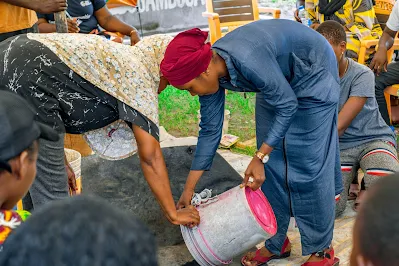GIT, Sauti ya Jamii empowering Communities with Sustainable Energy
By Deogratius
Temba
Global Impact
Transformation (GIT) recently held a workshop in Kipunguni, Dar es Salaam,
teaching 66 people, including women, men, children, and people with
disabilities, how to make alternative charcoal. This eco-friendly fuel helps
reduce deforestation and promotes sustainable living, aligning with the UN's
climate action goals (SDG 13) and contributing to gender equality (SDG 5) by
empowering women economically.
Fatma Abdulrahman,
Chairperson of Sauti ya Jamii-Kipunguni, emphasized the importance of
community-driven solutions for environmental conservation and economic
empowerment. "This workshop is more than just an environmental effort; it
is about giving our communities the tools they need to create a better, more
sustainable future," she stated.
Humphrey Evarist
Ottaru, Coordinator from GIT, explained that alternative charcoal is a
"game-changer" because it reduces the need to cut down trees,
provides affordable energy, and creates economic opportunities.
Participants
learned two methods of making alternative charcoal: one using rotten poultry
food and another using cardboard boxes. They mixed materials like clay, cassava
porridge, and water to create charcoal briquettes. Before the workshop, 97% of
the attendees had never heard of alternative charcoal, showing how important
this educational initiative is.
The workshop also
highlighted the economic benefits of alternative charcoal, presenting it as a
potential business opportunity. One facilitator noted, "For women, this
project is a breakthrough in fighting poverty. It enables them to produce and
sell an affordable fuel source while reducing the time spent collecting
firewood, which is often an unpaid burden on them."
GIT plans to
continue these workshops, build more partnerships, and advocate for policies
that support the use of alternative energy.
Martha Nghambi,
the Executive Director of GIT, emphasized the organization's focus on
environment, sustainable energy, clean energy such as alternative charcoal
production, and climate change, particularly as it relates to empowering women,
children, and persons with disabilities. As she explained, " "At GIT,
we believe that addressing climate change and promoting sustainable energy
solutions go hand-in-hand with empowering women, children, and persons with
disabilities. Our work with alternative charcoal production is a prime example.
It protects our environment and creates economic opportunities, particularly for
women, allowing them to become agents of change in their communities. In
providing access to clean energy and sustainable livelihoods, we're building a
more resilient and equitable future for everyone." - Martha Nghambi,
Executive Director, Global Impact Transformation (GIT)
















No comments:
Post a Comment